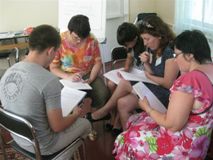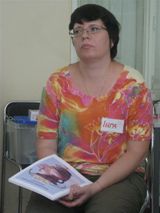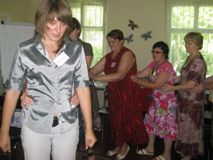-
« News
23/06/11
Sincerity is the key to mentoring. Partnership for Every Child trains mentors for care-leavers from residential care institutions.
15 mentors for care leavers are ready to start working with care-leavers in the town of Bila Tserkva and Vyshgorod District in the framework of the Ukrainian-Swiss project «Sure Start».
«Mentoring is a model used since ancient times for experience and knowledge transfer, - Zoryana Verbych, project manager of the «Sure Start», explains.
It strengthens care leaver’s support network and activates child’s resources and environment to maximize the response to child’s needs identified through comprehensive needs assessment» - she concludes.
Mentors, who are they?Typically representatives of social professions, such as social workers, psychologists and educators dare to work with orphans and children deprived of parental care.
Initially candidates for mentoring are interviewed by the social worker and then go through one-day training. Through individual and group assignments there participants learn social and psychological characteristics of care leavers, mentoring methods, simple instructions and communication skills for successful mentoring experience and valuable relationship with the child.
The voluntary nature of this role is both strength and a challenge. Finding people for this role is very difficult. At the same time those that have agreed to become mentors are usually highly motivated.
«I would like to try myself in the new role, - says Inga Kurtishova, a psychologist from Bila Tserkva city children’s home «Voloshka» and a mother of two kids:
For own kids I am a mother, but for someone else will happily become a mentor – someone, who provides a child with a possibility of making a choice, gives some advice, listens to and eventually becomes a person of reference».
She thinks it is very important to have an experienced person nearby and gratefully talks about her own first ‘mentor’, an educator from the kindergarten where she worked after failed application to the university:
«This woman was pushing and finally pushed me to apply again to the University».
Key points to remember while working with children
Oksana Kostyk has a significant mentoring experience, now working as a social worker for the Care Leavers’ Socialization Service, also a trainer for future mentors.

Already few years ago Oksana dared to work with 16-year old Anya from Pereyaslav Khmelnytskyy Boarding Lyceum. The girl that grew up without parental care during closer communication turned out to be a creative and well-rounded personality – she was drawing, embroidering, played in the orchestra, took part in various Olympiads and competitions.
Together with her mentor, Anya managed to strengthen herself and improve the relationship with her adopted brothers and sisters, establish friendly relations with their parents, people she considers her grandfather and grandmother. Oksana and Anya also went through a road accident experience, when Anya already supported Oksana.
«Sincerity is the key to mentoring. Be yourself, make friends, do not treat mentoring as a panacea from everyday problems, do not consider it a mission of your life, treat it as work» - the experienced mentor recommends.
After the first positive practice Oksana decided to devote herself to social work and now trains new mentors for orphans.
«You cannot be a magician and overcome all the problems in people's lives as they make their own choices and live them» – she warns future mentors preventing overprotective attitudes, excessive expectations and disappointments caused by those.«It’s important to be prepared for initial failures. These are normal humane relationships and as such they are unpredictable»,- reiterated the trainer.
Following the training social workers will arrange natural ‘matching’ of mentors and young people. Naturally, needs and wishes of young people will be taken into account during this process as well the resources, strengths of the potential mentor. Project participants will aim to make this process as natural as possible, since both mentees and mentors need time to get to know each other.
Then the actual work commences - weekly mentor and mentee meetings, organization of joint leisure activities, when mentor and mentee get to discover each other. During next few months they jointly set goals and objectives for the next years of young person’s life. The mentor has the task of supporting the achievement of outlined goals through personal example and organized meetings with relevant people. This process is always accompanied by a social worker, who regularly receives feedback both from mentors and mentees.
The minimum period of mentoring is six months, but training organizers hope that this partnership will not be limited in time and become one of the first relationships in care leaver’s social support network.Notes for editors:
Care-Leavers’ Integration Programme «Sure Start» aims to create a system of training and support for vulnerable young people during their transition to independent living. The project is implemented by Partnership for Every Child in cooperation with Swiss Foundation of International Social Service, funded by the Swiss Agency for Development and Cooperation and the Government of the Geneva Canton, Switzerland.
From 2010 to 2013 the project will extend its services to about 800 orphans and children deprived of parental care, including students and graduates of residential care institutions, children in foster care, under guardianship, and in family type children homes. In addition to traditional forms of work, the project introduces the mentoring for young people and temporary rental scheme at the place of residence, work or study for graduates who do not have their own housing at the time of transition to independent living.Contacts:
Zoryana Verbych
Project coordinator
Oksana Shved
Deputy Head - Development






